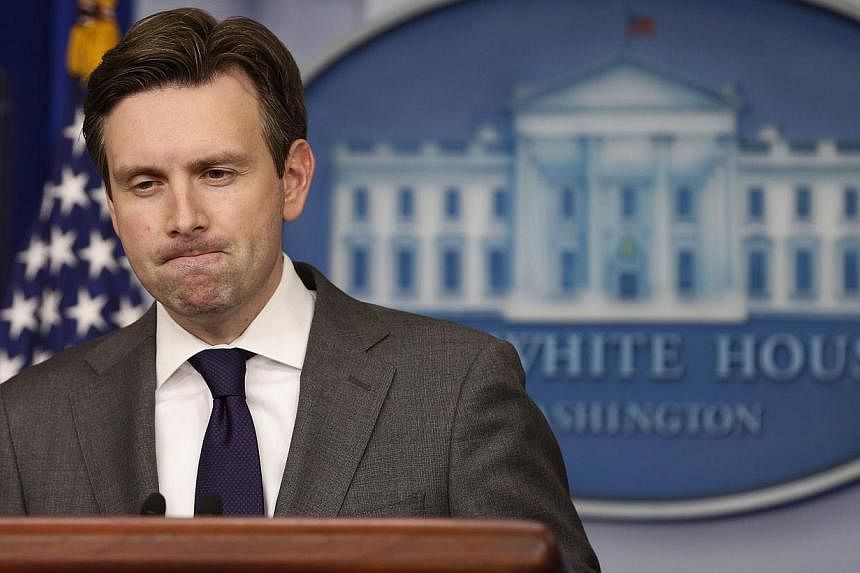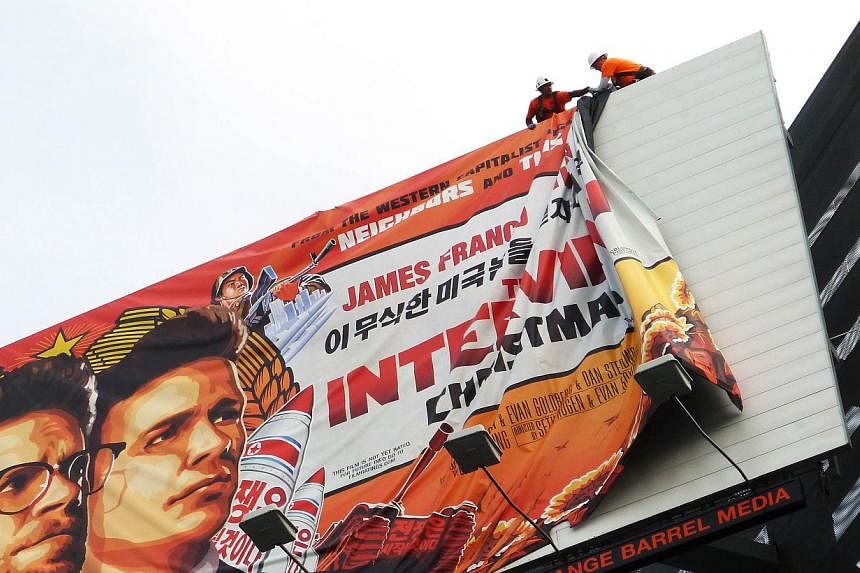WASHINGTON (AFP) - The cyber attack that forced Sony Pictures to scrap a comedy about North Korea is a "serious national security matter," the White House warned Thursday, threatening an "appropriate response."
And, as Hollywood scandal threatened to escalate into geopolitical crisis, Sony defended its decision to cancel the release of The Interview, a movie about a fictional CIA plot to kill North Korean leader Kim Jong-Un.
"This is bigger than us," the studio insisted, even as footage that leaked onto the Internet showed that the film's climax was to have been a graphic close-up of the North Korean leader's fiery death.
White House spokesman Josh Earnest declined to confirm reports that North Korea had attacked the movie giant, which pulled the the film after hackers invoked 9/11 in threatening attacks on cinemas.
But, in a sign US intelligence believes that the attack came from an enemy of the United States, he said: "The President considers this to be a serious national security matter."
Mr Earnest said the attack, which saw hackers gain access to a trove of internal Sony documents, was carried out by a "sophisticated actor."
"There has been destructive activity with malicious intent, and the administration believes that that activity merits an appropriate response from the United States," he told reporters.
"That is something that's being investigated, and the appropriate response is something that is being carefully considered by members of the President's national security team," he said.
Others have been less reluctant to point the finger. A Sony source told AFP that, while it was up to US authorities to determine what happened, the studio believes Pyongyang was behind it.
"We don't know, but it appears so," said the source.
North Korea has denied involvement in the brazen Nov 24 cyber attack, which experts say could have been carried out by disgruntled Sony workers or by supporters of a foreign power.
Sony cancelled the film's release after major US theatre chains said they would not screen The Interview, a mad-cap comedy in which two television journalists are recruited to assassinate Kim.
Free speech advocates and foreign policy hawks slammed the decision as cowardice in the face of a hidden enemy.
Former presidential nominee Senator John McCain lashed Sony for backing down, a few days after the so-called Guardians of Peace (GOP) hacker group invoked 9/11 in threatening cinema-goers.
"By effectively yielding to aggressive acts of cyber-terrorism by North Korea, that decision sets a troubling precedent that will only empower and embolden bad actors to use cyber as an offensive weapon even more aggressively in the future," said McCain.
A Sony source said the Hollywood studio had no choice.
The studio was faced with a credible threat to its customers and most major US theatre chains had said they would not screen movie, due for release on Dec 25, Christmas Day.
"There was some sadness on the lot that it came to this. But in time I think that it's something that, you know, we had to respect what the theatre owners needed to do for their audiences," said the source.
"This was a terrorist act, and you don't take that lightly," he added, saying: "This is much bigger than us ... it's a whole new world, now warfare is on the cyber level."
Skittishness about attending the movie followed threats by a hacking group calling itself GOP, which invoked the Sept 11, 2001 attacks in an ominous warning to any moviegoers planning to see the film.
Experts said Sony's decision sets a dangerous precedent.
"I am sympathetic with Sony and I am sympathetic with any theater that worries about damage and injury and worse involving its staff and its customers," said Richard Walter of the UCLA Film School.
"But on the other hand I have to say there is something, for an American and for anybody who loves freedom, that viscerally rebels against surrendering to terror this way," he told AFP.
"The single most disturbing aspect of this whole case it the notion that studios might cave, might surrender to lunatics of the political fringe in terms of what movies they make and what movies they release."
Rob Lowe, who is among a number of leading film actors who have small cameo roles in the movie alongside its main stars Seth Rogen and James Franco, did not disguise his indignation.
"Wow. Everyone caved. The hackers won. An utter and complete victory for them. Wow," he said.
In addition to threats, Sony has seen the release of a trove of embarrassing e-mails, scripts and other internal communications, including information about salaries and employee health records.


